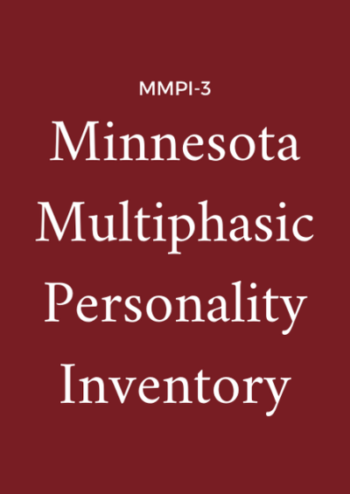If you’re looking for a comprehensive guide to the Minnesota Multiphasic Personality Inventory, look no further! In this blog post, we’ll provide an overview of the test, what it is and how it’s used. We’ll also discuss some of the key criticisms that have been leveled against the MMPI over the years. So whether you’re considering taking the test yourself or are just curious about it, read on for more information!
Contents
What is MMPI?

Popularly abbreviated as MMPI, the Minnesota Multiphasic Personality Inventory is a psychological test that assesses personality traits and psychopathology. It was developed by psychologist Donald O. Hebb and his colleagues in the year 1937. The MMPI consists of 550 True/False questions and takes about 60-90 minutes to complete. It also helps in diagnosing conditions like depression, anxiety, and post-traumatic stress disorder (PTSD). It has also been used to screen for things like substance abuse problems.
The 10 Clinical Subscales of the MMPI
The MMPI scores on ten clinical subscales. These subscales simply measure different aspects of personality and psychopathology. where an individual falls on 10 different mental health scales to diagnose the patient and get them the proper treatment they need. These subscales are:
Hypochondriasis
This section contains 32 items. These assess whether you have an unhealthy concern over your health.
Depression
The 52 items in this subsection measure your satisfaction with your own life. A higher score on this scale may indicate the presence of suicidal thoughts or may need further tests to diagnose clinical depression.
Hysteria
This 60 item sub-scale evaluates your stress response to both physical and mental factors. It also factors in an individual’s emotional release when exposed to high pressure.
Psychopathic Deviate
This 50 item measure aspect weighs the intensity of your antisocial behaviors. A higher score on this test may require further assessment for a personality disorder.
Masculinity/Femininity
Originally, the 56 items in this sub-scale were used to interpret people’s sexuality. Today, it assesses how an individual identifies with societal gender norms.
Paranoia
The 40 items in this category associate with the symptoms of paranoia. These include feelings of high suspicion, rigid thinking, and trust issues. An elevated score may recommend an individual to go for further assessments for an official diagnosis of a psychosis disorder.
Psychasthenia
The 48 items in this category evaluate an individual’s unhealthy compulsions and disruptive feelings. A higher score on this scale may indicate symptoms of anxiety, obsessive-compulsive disorder, or even depression.
Schizophrenia
This subsection containing 78 subsections categorizes the possibility of an individual having symptoms of schizophrenia.
Hypomania
The 46 items in this sub-scale assess the likeliness of hypomania, which may moreover lead to a diagnosis of bipolar disorder.
Social Introversion
Although it is a recent addition to the scale, the 69 items of this category recognize an individual’s introverted or extroverted tendencies. It also evaluates the quality of a person’s social interactions.
What To Expect From MMPI?

The MMPI is a comprehensive test that measures a wide range of personality traits and psychopathology. The questions probe into your deepest thoughts and feelings. As such, it’s important, to be honest when taking the test. If you’re not sure about an answer, it’s better to choose “False” than to guess.
Another important thing to remember is that the MMPI does not provide for an official diagnosis of any disorder. If you score higher in any sub-category, your administrator may recommend you for further tests to assess the possibility of a clinical disorder.
How Does It Work?
The MMPI is a true/false test, which means there are no right or wrong answers. Rather, your responses generate a profile of your personality. This happens either through a computer or pen-paper. It takes about 25-40 minutes to administer and evaluate. A clinical psychologist or psychiatrist is in charge of the interpretation of the scoring.
How Is It Helpful?

Most commonly, the MMPI gets observed in clinical settings. It is used to help diagnose mental disorders or screen for potential candidates for psychiatric treatment. It also measures the effectiveness of treatment programs. In addition, the MMPI has been used in several legal cases. These include evaluations of defendants’ competency to stand trial and their likelihood of committing future crimes.
Key Criticisms of MMPI
Despite its popularity, the MMPI has been the subject of several criticisms. One common criticism is that the test shows biases against certain groups, such as women and minorities. Others argue that the test measures only superficial personality traits rather than deep-seated psychopathology. The MMPI results are also easy to fake or manipulate by test takers. Several psychologists also claim it to be out of date. Another weakness of this test is that it is not an official basis of diagnosis and needs further evaluations.
Conclusion
The Minnesota Multiphasic Personality Inventory is a comprehensive personality test that measures a wide range of personality traits and psychopathology. A clinical psychologist or psychiatrist administers this test. It has also been the subject of several criticisms. Despite its weaknesses, the MMPI can be a useful tool in helping to assess personality disorders and other mental health conditions. We analyzed all aspects of this test in detail. If you want to undertake this test, be sure to get in touch with a qualified professional
A Word From Therapy Mantra
Your mental health — Your psychological, emotional, and social well-being — has an impact on every aspect of your life. Positive mental health essentially allows you to effectively deal with life’s everyday challenges.
At TherapyMantra, we have a team of therapists who provide affordable online therapy to assist you with issues such as depression, anxiety, stress, workplace Issues, addiction, relationship, OCD, LGBTQ, and PTSD. You can book a free therapy or download our free Android or iOS app.


